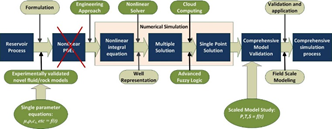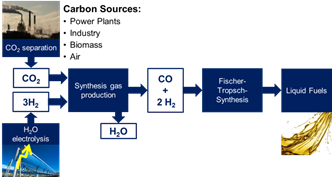Day 1 :
Keynote Forum
M. Enamul Hossain
Statoil Chair in Reservoir Engineering at Memorial University of Newfoundland, St. John’s, Canada
Keynote: Current Trends and Challenges in Reservoir Simulation
Time : 10:00-10:40

Biography:
Professor M. Enamul Hossain has the expertise in reservoir engineering and simulation, sustainable drilling engineering, and enhanced oil recovery where he contributed over 150 articles, seven books, and seven patents. Currently, he is holding the Statoil Chair in Reservoir Engineering at Memorial University of Newfoundland, St. John’s, Canada. In over 22 years, Prof. Hossain has developed new methodologies, techniques, and materials in areas of his expertise. Prof. Hossain is the associate editor of Journal of Nature Science and Sustainable Technology (JNSST), Journal of Characterization and Development of Novel Materials (JCDNM), Nova Science Publishers, USA and Journal of Sustainable Energy Engineering (JSEE), Scrivener and Welly publishing, USA. He has been an active member of a number of international societies, including the SPE. Prof. Hossain is the founder and Chairman of Aziza Trust (www.azizatrust.com) and was on the Board of directors of Aziza group in Bangladesh, Bright Coral in Canada.
Abstract:
Reservoir simulation is a critical element in the development, planning and production management of oil and gas fields. The ultimate goal of reservoir simulation is to aid the decision making process throughout all stages of field life. The major sources of uncertainties are the linearization of all governing equations – a standard practice in reservoir modeling. It is currently considered that obtaining exact solutions is not achievable due to the lack of non-linear solvers. In literature, it has been shown that this assertion is not justified for most of the realistic range of petroleum parameters, even for single-phase flow. The impact of linearization is even more important for multiphase flow. Recent literature shows that few models include non-Darcy flow under multiphase flow conditions, even fewer use non-Darcy equations for dual-porosity, dual-permeability description, and none uses transition between various flow regimes within porous media and fracture networks. Further, there is a limited number of studies on non-Newtonian nature of petroleum fluids. So, there is an immense need to focus on developing new sets of mathematical models of complex reservoir rock and fluid systems that will lead to the development of more accurate, and state of the art performance prediction tools. However, challenges remains on how to solve these highly non-linear models, and validate the numerical findings through experiments. Experimentally, capturing memory is a real challenge because it cannot be visualized and tracked easily with conventional experimental practices.
Numerical solutions of non-linear equations, including considerations of time function both in fluid and rock systems, will produce multiple solutions, forming a cluster of points. Challenge remains how to tag these points with confidence. In parallel, specifically designed experimental trials will be a choice to validate these mathematical models. These models, combined with non-linear solvers that are capable of tracking multiple solutions, will possibly make the most comprehensive reservoir simulator to-date. The resulting simulator can be applied to highly heterogeneous and heavy oil reservoirs.

Recent Publications:
1. Obembe, A.D., Hossain, M.E., Mustapha, K.A. and Abu-Khamsin, S.A. (2016). A modified memory-based mathematical model describing fluid flow in Porous Media. Computers and Mathematics with Applications, in press.
2. Obembe, A.D., Hossain, M.E., and Abu-Khamsin, S.A. (2016). Variable-order derivative time fractional diffusion model for heterogeneous porous media. Journal of Petroleum Science and Engineering, in press.
3. Bin Dahbag, M.S., Hossain, M.E., and Al-Quraishi, A.A. (2016). Efficiency of Ionic Liquids as Enhanced Oil Recovery Chemical: Simulation Approach. Energy & Fuels, 2016, in press.
4. Hossain, M.E. (2016). Role of Porosity on Energy Transport with Equal Rock-Fluid Temperatures during Thermal EOR Process, Arabian Journal of Science and Engineering. DOI: 10.1007/s13369-016-2343-8, in press.
5. Hossain, M.E. and Wajheeuddin, M. (2016). The Use of Grass as an Environment-Friendly Additive in Water-Based Drilling Fluids, Petroleum Science, 13(2):292-303.
Keynote Forum
Ralph-Uwe Dietrich
German Aerospace Center (DLR), Germany, Stuttgart
Keynote: Synthetic jet fuel from renewable energy sources for sustainable aviation
Time : 10:40-11:20

Biography:
Dr.-Ing. Ralph-Uwe Dietrich leads the research area Alternative Fuels at the Institute of Engineering Thermodynamics at the German Aerospace Center (DLR) in Stuttgart. He is responsible for the research group on techno economic and ecologic evaluation of alternative fuels for aviation and global transport. He received his PhD in Engineering at the Technical University Clausthal in 2013 as a Scientific coworker at the Clausthaler Umwelttechnik Institute (CUTEC-Institut GmbH). Before that, he got 15 years of project manager experience at different enterprises (SME and Fortune 500) of the process and automation industry.
Abstract:
Advanced technologies, optimized operation and infrastructure are not sufficient to achieve the CO2 mitigation goals agreed on for the aviation sector. Carbon neutral alternative liquid fuels are required to fill the gap towards a carbon-neutral growth from 2020 on. The Power-to-Liquid process is one option to produce synthetic jet fuels from renewable energy. The technical and economic performance of production processes based on renewable electricity and CO2 was investigated and evaluated.
Hydrogen can be generated by water electrolysis from fluctuating renewable power sources. Together with CO2 – e.g. sequestrated from industrial resources – the reverse water-gas-shift reaction forms syngas. The Fischer-Tropsch synthesis produces long chained hydrocarbons from syngas. Downstream product separation and upgrading generates gasoline, jet fuel and diesel. Another process concept is based on high temperature co-electrolysis of steam and CO2 producing synthesis gas at high temperature and pressure.
The process performance is evaluated via flowsheet simulation models and pinch point analyses comparing the Power-to-Fuel efficiency as well as carbon conversion into liquid fuels. A baseline Power-to-Fuel efficiency of 44 % for the concept based on water electrolysis can be increased to 60 % using the co-electrolysis concept. The baseline carbon conversion of 73 % grows to 98 %. The sensitivity of various operation conditions was analyzed.
A cost analysis based on market data and equipment factors was performed for the investment year 2014. Employing stationary power input of 105 €/MWh, production costs of 3.38 €/kg were found for the water electrolysis concept. The production costs of the co-electrolysis concept compare to 2.83 €/kg. The sensitivity of the electrolyzer capital cost and electricity prices were analyzed and their effect on the production costs will be presented.
Investment and operating costs to fill the gap towards carbon-neutral air transport growth from 2020 on can be predicted based on 2014 costs and technology status. A comparison to other renewable jet fuels regarding land use, feedstock potential and economic measures will be provided.

Recent Publications:
1. Albrecht F.G, König D.H, Baucks N, Dietrich, R.-U. (2017) A standardized methodology for the techno-economic evaluation of alternative fuels - A case study, Fuel (accepted for publication)
2. Albrecht F.G, Zhang J, Dietrich, R.-U. (2016) Process design and economic assessment of converting CO2 to liquid fuels. ACI's 7th Carbon Dioxide Utilization Summit 2016, 19.-20. Oct. 2016, Lyon, France.
3. Albrecht F.G, König D.H, Dietrich, R.-U. (2016) The potential of using power-to-liquid plants for power storage purposes. In: 2016 13th International Conference on the European Energy Market (EEM), S03_10163. 06.-09. Jun. 2016, Porto, Portugal. DOI: 10.1109/EEM.2016.7521203 ISBN 978-1-5090-1297-8.
4. König D.H, Albrecht F.G, Dietrich, R.-U. (2016) Power and Biomass-to-Liquid (PBtL): a Promising Approach to Produce Biofuels using Electricity. In: Papers of the 24th European Biomass Conference, 1074-1078. ETA-Florence Renewable Energies. 06.-09. Jun. 2016, Amsterdam, Netherland. DOI: 10.5071/24thEUBCE2016-3CO.7.3 ISBN 978-88-89407-165 ISSN 2282-5819
5. König D.H, Baucks N, Dietrich, R.-U., Wörner A (2015) Simulation and evaluation of a process concept for the generation of synthetic fuel from CO2 and H2. Energy, 91, Seiten 833-841. Elsevier. DOI: 10.1016/j.energy.2015.08.099 ISSN 0360-5442
